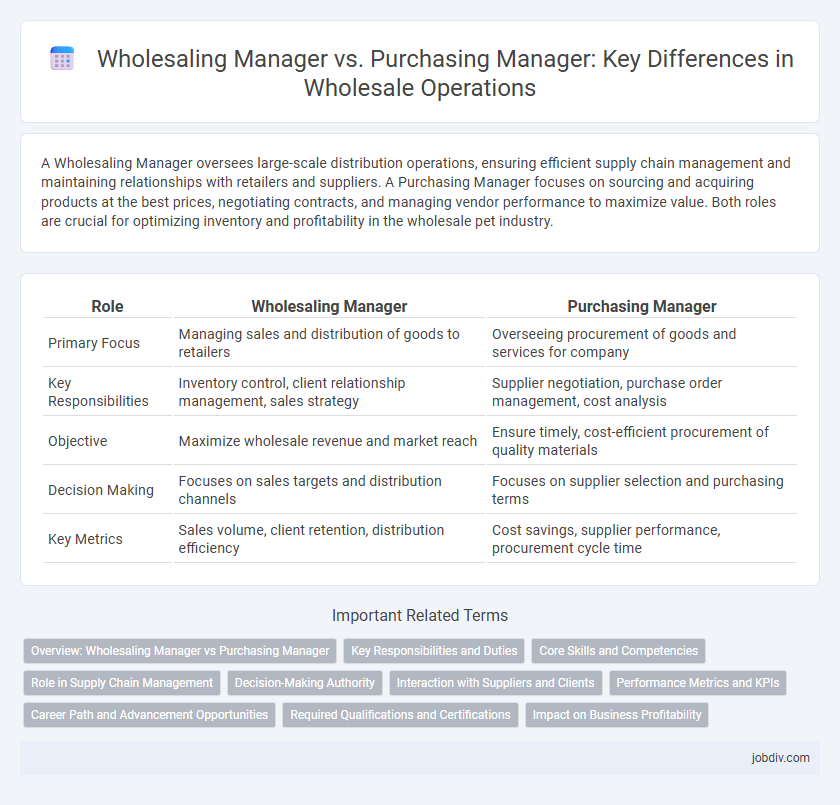A Wholesaling Manager oversees large-scale distribution operations, ensuring efficient supply chain management and maintaining relationships with retailers and suppliers. A Purchasing Manager focuses on sourcing and acquiring products at the best prices, negotiating contracts, and managing vendor performance to maximize value. Both roles are crucial for optimizing inventory and profitability in the wholesale pet industry.
Table of Comparison
| Role | Wholesaling Manager | Purchasing Manager |
|---|---|---|
| Primary Focus | Managing sales and distribution of goods to retailers | Overseeing procurement of goods and services for company |
| Key Responsibilities | Inventory control, client relationship management, sales strategy | Supplier negotiation, purchase order management, cost analysis |
| Objective | Maximize wholesale revenue and market reach | Ensure timely, cost-efficient procurement of quality materials |
| Decision Making | Focuses on sales targets and distribution channels | Focuses on supplier selection and purchasing terms |
| Key Metrics | Sales volume, client retention, distribution efficiency | Cost savings, supplier performance, procurement cycle time |
Overview: Wholesaling Manager vs Purchasing Manager
Wholesaling Managers oversee the distribution of goods to retailers or other business buyers, focusing on sales strategies, inventory management, and client relationships to maximize wholesale revenue. Purchasing Managers concentrate on acquiring products and materials for the company, negotiating with suppliers to ensure quality, cost efficiency, and timely delivery. Both roles require strategic planning and strong negotiation skills, but Wholesaling Managers drive sales channels while Purchasing Managers optimize supply chain procurement.
Key Responsibilities and Duties
A Wholesaling Manager oversees the distribution network, manages client relationships, and ensures inventory levels meet market demand to optimize sales volume. A Purchasing Manager is responsible for sourcing suppliers, negotiating contracts, and maintaining cost-effective procurement strategies to sustain supply chain efficiency. Both roles are critical in wholesale operations, but the Wholesaling Manager focuses on sales and distribution, while the Purchasing Manager concentrates on acquiring goods and managing supplier partnerships.
Core Skills and Competencies
A Wholesaling Manager excels in supply chain coordination, inventory management, and client relationship development, emphasizing strong sales acumen and negotiation skills to drive bulk transactions. A Purchasing Manager focuses on vendor evaluation, cost analysis, and procurement strategy, highlighting expertise in contract management and market trend analysis to optimize sourcing. Both roles require analytical thinking and communication skills, but the Wholesaling Manager leans more toward customer-facing activities, while the Purchasing Manager prioritizes supplier interactions and internal cost control.
Role in Supply Chain Management
A Wholesaling Manager primarily oversees the distribution of goods from manufacturers to retailers, ensuring efficient inventory turnover and optimizing sales channels within the supply chain. In contrast, a Purchasing Manager concentrates on sourcing, negotiating, and procuring raw materials or products, directly managing supplier relationships and cost control to maintain supply chain continuity. Both roles are crucial in supply chain management, with the Wholesaling Manager focusing on downstream distribution logistics and the Purchasing Manager emphasizing upstream procurement strategies.
Decision-Making Authority
A Wholesaling Manager holds extensive decision-making authority in selecting product lines, setting pricing strategies, and managing large-scale inventory distribution to optimize market reach and profitability. In contrast, a Purchasing Manager primarily focuses on procurement decisions, supplier negotiations, and cost control to ensure timely acquisition of goods at competitive prices. The Wholesaling Manager's strategic decisions impact overall sales performance, while the Purchasing Manager's tactical decisions influence supply chain efficiency.
Interaction with Suppliers and Clients
A Wholesaling Manager primarily interacts with clients to understand market demand and manage large-scale product distribution, ensuring efficient sales channels and customer satisfaction. In contrast, a Purchasing Manager focuses on supplier relationships, negotiating prices, terms, and managing procurement processes to secure inventory at optimal costs. Both roles require strong communication skills, but the Wholesaling Manager aligns client needs with supply capabilities, while the Purchasing Manager directly manages supplier performance and contract fulfillment.
Performance Metrics and KPIs
Wholesaling Managers primarily focus on sales volume, order fulfillment rates, and customer retention metrics to drive revenue growth and optimize supply chain efficiency. Purchasing Managers emphasize cost savings, supplier lead times, and inventory turnover rates to ensure procurement effectiveness and minimize holding costs. Both roles use KPIs such as purchase price variance and supplier performance scores, but Wholesaling Managers prioritize market demand and sales velocity while Purchasing Managers concentrate on cost control and supplier reliability.
Career Path and Advancement Opportunities
Wholesale managers typically advance into senior roles overseeing supply chain logistics and client relations, leveraging experience in bulk sales and distribution strategies. Purchasing managers often progress toward strategic sourcing director positions, specializing in vendor negotiation, procurement efficiency, and cost reduction initiatives. Both paths offer leadership development, but wholesale management emphasizes market expansion while purchasing management focuses on optimizing procurement processes.
Required Qualifications and Certifications
A Wholesaling Manager typically requires a bachelor's degree in business administration, supply chain management, or a related field, along with certifications such as Certified Wholesale Distributor (CWD) to demonstrate expertise in wholesale operations and inventory management. Purchasing Managers often need a similar educational background but benefit greatly from certifications like Certified Professional in Supply Management (CPSM) or Certified Purchasing Manager (CPM), which focus on procurement strategies, vendor relations, and cost control. Both roles demand strong analytical skills and experience in contract negotiation, though the certifications emphasize distinct aspects tailored to wholesaling efficiency or strategic purchasing.
Impact on Business Profitability
Wholesaling Managers directly influence business profitability by optimizing inventory turnover and negotiating favorable bulk pricing, which reduces costs and enhances revenue margins. Purchasing Managers contribute by strategically selecting suppliers and managing procurement processes to ensure quality products at competitive prices, minimizing waste and excess expenditure. Both roles collaboratively drive profitability through effective cost control and supply chain efficiency within wholesale operations.
Wholesaling Manager vs Purchasing Manager Infographic

 jobdiv.com
jobdiv.com